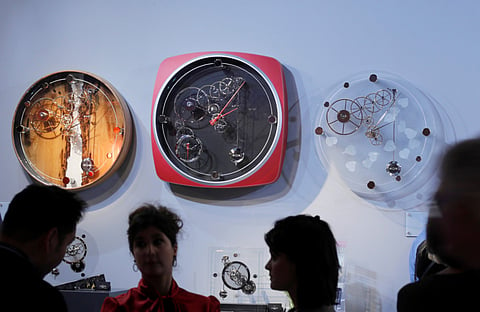Swiss watchmakers get over their ‘smart’ fears
Traditional watchmaking can deliver more than time, says Tissot chief

Dubai: The way Francois Thiebaud sees it, watches should be more than about telling you what the time is.
Instead, “They should be about giving the owner “memories” of time — and something they can associate the watch with,” said Thiebaud, President of the Tissot brand, which is itself part of Swatch Group. “By being on your wrist all the time, they become a part of time.
“If anyone wanted only to know the time, they can get it from anywhere — their computer screen, mobile phone or any other device in their home. But they don’t come with memories — watches do. A classic watch is not a gimmick, it’s a part of you and part of your dress code.”
And Thiebaud winds up to deliver his punch line — “Even smart watches can’t deliver on the memories. Traditional watches you tend to hold on — can anyone say the same about their mobile phones or smart watch? I guess not.”
Thiebaud’s peers in the Swiss watch industry may also be delivering similar messages. Swiss watchmakers have had a second successive year of growth — global sales crossed the $21 billion mark, up 6.3 per cent on 2017. Those were enough to erase the bitter memories from 2015 and 2016, when demand caved in key markets such as China. Plus, the industry was caught up in the uncertainty over smart watches and how seriously the category should be viewed as direct competition. It coincided with the arrival of Apple’s smart watch in 2015.
And some Swiss watchmakers even tested the market with their hybrid versions, bringing on board some of the web-enabled features and mobile phone connectivity seen in smart watches. But the industry’s verdict after three years is that the traditional and smart can live side by side.
“The traditional industry did not collapse because of the smart evolution — Swiss watch sales had a strong first part in 2018 and less so in the second,” Thiebaud added. “Still, we could see a lot of potential ahead of us.
“Of course, we have to build on — and believe in — tradition. That’s why the Swiss watch industry succeeded in the first place.
“I’m French — but when it comes to making watches, I have no issues saying you need to do it in Switzerland. Some of the biggest French luxury labels have done just the same with their watch offerings.”
But no one — not even the most tradition-minded of Swiss watchmakers — will deny that the smart watch category is assuming sizeable proportions. Latest estimates suggest its size in value terms has crossed $5 billion as of end 2018, with growth rates in the high 50 per cent plus band.
Isn’t it the case that with the young, at least, traditional watch brands are less likely to feature on their wrists? Thiebaud counters that by saying: “Even the young are looking for classical watches — in many ways, the world is going back.
“All this emphasis on the new and the latest ended in 2008 when the Great Recession struck. People’s buying habits have changed in these 10 years. But tradition will still have a place.”
Would that mean Tissot will not go anywhere near smart technologies with their watches? “Early next year we will have some models with connected features — but it’s not going to be a smart watch,” the President declared.
“It definitely won’t allow you to answer calls — if someone wants to use a mobile, they do it on that, not on the watch.”
Thiebaud definitely knows where to draw that line.
Looking beyond Baselworld
There was a time when no Swiss watch label could afford to miss out on a prime spot at Baselworld, the industry’s premier showcase for launches and advances. Not any longer.
Last year, the Swatch Group — which owns the likes of Omega, Longines and Tissot and is the biggest watch company in the world — decided it would not participate. “These days, if you want to meet your partners, it’s better to do so in their own markets than try to do it at Baselworld,” said Francois Thiebaud of Tissot.
“That’s why I’m in Dubai this week, and then fly to Kuala Lumpur and Berlin and all the main markets. I have to do it because Tissot has more than 13,000 point-of-sales, 100 plus boutiques and so many shop-in-shops. We have to listen to our partners.
“You can’t do all of that at Baselworld — it’s so difficult to deliver a clear message there to your partners, because so much time is spent with the media.”



